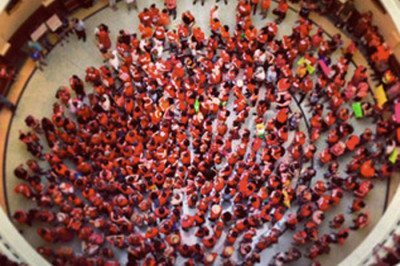Texas’ Radical Anti-Abortion Law Faces Hearing Friday
On Friday, a panel of judges from the Fifth Circuit will consider whether the State of Texas should be allowed to immediately enforce the provision of HB 2 requiring abortion facilities in the state to meet the building requirements of ambulatory surgical centers.

Texas’ omnibus anti-abortion law, HB 2, continues to wind its way through the legal system two weeks after a district court judge found the law unconstitutional.
On Friday, a federal appeals court will hear arguments filed by the Texas attorney general’s office to block a federal district court decision from late August. That ruling found unconstitutional a provision of HB 2 that would require every licensed abortion facility in the state to meet the building requirements of an ambulatory surgical center (ASC).
District Judge Lee Yeakel ruled in August that the provision places an undue burden on women’s right to choose abortion and blocked the state from enforcing the law.
Immediately after the ruling, Attorney General Greg Abbott’s office filed an emergency appeal with the U.S. Court of Appeals for the Fifth Circuit arguing it should be allowed to enforce the requirement as it appeals the merits of Judge Yeakel’s decision.
The Fifth Circuit denied the state’s request to immediately block the lower court ruling and instead ordered a hearing for September 12, when a panel of judges will consider whether the state should be allowed to enforce the ASC provision while the federal appeals court considers its constitutionality.
The Fifth Circuit could rule on the State of Texas’ emergency request any time after Friday’s hearing.
Meanwhile, attorneys representing abortion clinics and doctors challenging the requirements filed their own appeal Tuesday of two aspects of Yeakel’s ruling.
Esha Bhandari, staff attorney at the Center for Reproductive Rights and one of the attorneys challenging the Texas law, explained the cross-appeal in an interview with Rewire.
“In his injunction, Judge Yeakel carved out an exception for any clinics that would open after September 1, when the law was set to take effect,” Bhandari said. “We are appealing that portion of the ruling because we think that injunction should apply to any clinics that open in Texas after September 1st should also not have to comply with the ASC law.”
In addition to claiming the ASC requirements unduly burdened abortion rights, the attorneys representing the providers claimed the requirements violate delegation powers and equal protection guarantees. Judge Yeakel dismissed those claims. Bhandari and her colleagues are appealing that dismissal as well. “The admitting privileges law is an unlawful delegation to private parties, in this case hospitals, to make the decision on whether women can access abortion care,” Bhandari explained. “We also raised an equal protection argument which is that only abortion is singled out for this type of regulation and not other medical procedures and that violates equal protection,” said Bhandari. “We’re appealing that dismissal because we would like to keep those claims alive for arguments at the appellate level.”
The Fifth Circuit will consolidate into one hearing the appeals challenging the merits of Yeakel’s ruling filed by the State of Texas and abortion providers. That hearing has not yet been scheduled.
The trial over the constitutionality of the ASC requirements is the second legal challenge to the anti-abortion provisions in HB 2.
A panel of Fifth Circuit judges previously upheld the portion of the law that requires doctors performing abortions in the state to have admitting privileges at nearby hospitals. Challengers have asked the entire Fifth Circuit to review that decision. A decision on that request is still pending.

